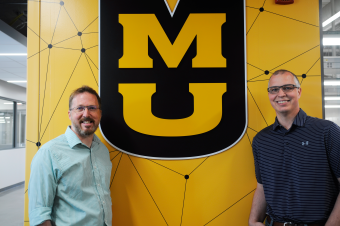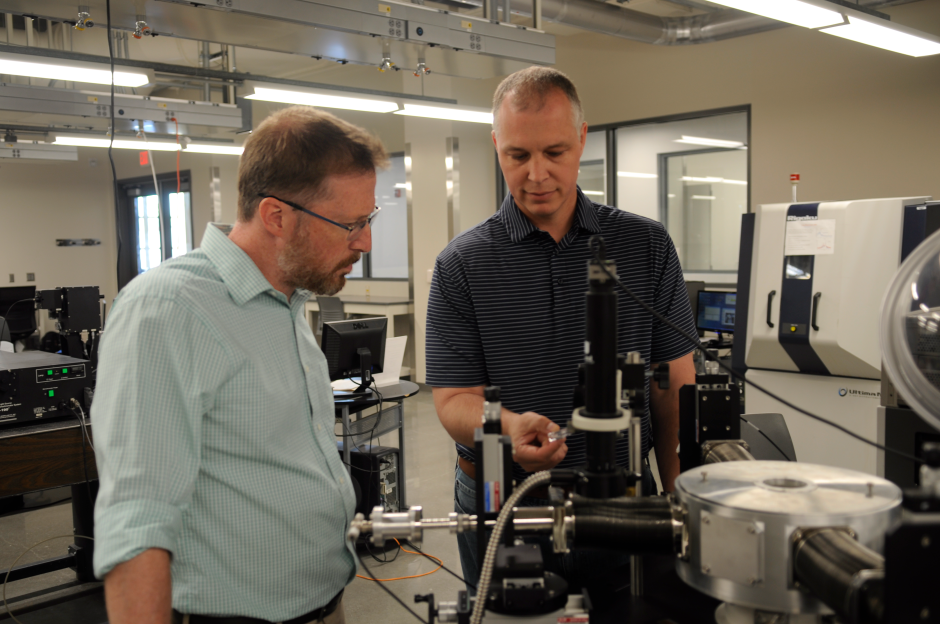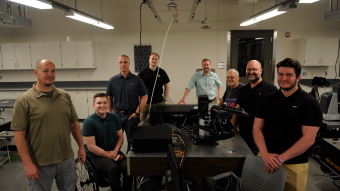How to Build an ‘Explainable AI’ Framework to Speed Up the Innovation Process
A nearly $4.9 million grant from the U.S. Army Engineer Research and Development Center (ERDC) is supporting the project by University of Missouri engineers.
More than a century has passed since Thomas Edison developed the first electric light bulb, yet Edison’s hallmark approach of ‘trial and error’ to reach his discovery still remains a large part of today’s inventions. Now, a team of engineers at the University of Missouri is embodying the age-old adage of “work smarter, not harder” by using artificial intelligence (AI).

Derek T. Anderson (left) and Matt Maschmann
Supported by a two-year, $4.875 million grant from the U.S. Army Engineer Research and Development Center (ERDC), the team from the MU College of Engineering, including Derek T. Anderson and Matt Maschmann, are developing a theoretical framework around “explainable AI” to describe how the next-generation of AI can be integrated into the innovation process for designing new and existing materials — while also securing the trust of humans along the way.
Maschmann, an associate professor of mechanical and aerospace engineering, knows this process well. For example, he’s been working with carbon nanotubes since 2003, yet Maschmann said their full potential as an engineering material is far from being realized. The same, he said, can be true for many material systems. Therefore, one of the MU team’s goals is finding a way to accelerate the discovery process by helping make better quality materials in a shorter period of time.
To do this, the team is starting with how to integrate AI and machine learning into the process, said Maschmann, whose passion for developing materials began in the early 2000s during graduate school.

Derek T. Anderson (left) and Matt Maschmann look at a material in the Materials Characterization and Fabrication Lab located in Lafferre Hall on the University of Missouri campus.
“One of the more pressing challenges in the development of new materials, or optimization of existing materials, is the time required by the processing and characterization steps,” Maschmann said. “Making discoveries takes quite a bit of time and money. For instance, each step of a process may take a day or longer to accomplish. Therefore, in a traditional laboratory environment, scientists will repeat a process multiple times in an attempt to obtain a specific structure or property for a material guided by intuition and previous knowledge. However, if we can introduce machine learning algorithms and AI into the process, it could drastically reduce the time needed to obtain material properties of interest. My hope is this project will greatly increase the rate of discovery for developing materials while also increasing our fundamental understanding of these processes.”

The team from the MU College of Engineering who will be working on the project supported by this grant.
While Maschmann focuses on the integration of AI and machine learning into materials processing, Anderson, an associate professor of electrical engineering and computer science, is working alongside him to help make AI more intelligent by determining how to better integrate human knowledge into the artificial world. For instance, Anderson said while material scientists, chemists and physicists have vast knowledge about the physical world, most AI and machine learning do not yet share that same level of intelligence.
“Therefore, we’re looking at how do we design the next-generation of AI and machine learning to take advantage of the existing knowledge that people have,” Anderson said. “Then, we want to use that knowledge to intelligently grow AI to be able to design smarter materials. While our efforts are focused on the ‘explainability’ side, and helping scientists and domain experts understand how these processes work, we hope to make AI smarter for everyone’s benefit in the process.”
Editor’s Note:
The content of the grant is solely the responsibility of the authors and does not necessarily represent the official views of the funding agencies. Visit the University of Missouri College of Engineering to learn how the college is celebrating its 150th anniversary in 2022.
Contact: Eric Stann, 573-882-3346, StannE@missouri.edu
Original Story Source: University of Missouri

 Alerts Sign-up
Alerts Sign-up